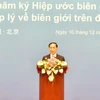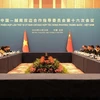A number of National Assembly (NA) deputies considered question-and-answer (Q&A) sessions and the confidence vote as highlights of the 13th NA’s freshly-concluded eighth session.
During this session, legislators questioned Minister of Industry and Trade Vu Huy Hoang, Minister of Home Affairs Nguyen Thai Binh, Minister of Transport Dinh La Thang, and Minister of Labour, War Invalids and Social Affairs Pham Thi Hai Chuyen. Prime Minister Nguyen Tan Dung also directly responded to issues of voters’ concern.
Deputy Phan Van Quy from central Nghe An province called this time’s Q&A sessions fruitful since answers given by the PM and the ministers substantively dealt with “hot” problems, showing their high sense of responsibility.
He valued the Cabinet members’ promises and feasible implementation measures, taking Minister Vu Huy Hoang’s solutions to smuggled and counterfeit goods, and Minister Dinh La Thang’s ways to tackle the increase of traffic projects’ costs as examples.
Q&A sessions touched upon pressing and complicated matters, deputy Tran Ngoc Vinh from northern Hai Phong city said, adding that more time is needed for more ministers to respond to concerned problems in the next NA sessions.
Sharing the same view, deputy Bui Thi An from Hanoi said PM Nguyen Tan Dung gave relatively proper answers to lawmakers’ questions, and proposed more time for his Q&A session.
Another highlight of this session, as many lawmakers said, was the vote of confidence on 50 officials holding positions elected or approved by the NA.
Tran Ngoc Vinh said several officials who received high rates of low confidence vote in the first vote of confidence last year strived to improve their performance, resulting in better rates of high confidence vote this time such as Minister Dinh La Thang and Governor of the State Bank of Vietnam Nguyen Van Binh.
Deputy Phan Van Tan from Nghe An said the confidence vote’s results satisfactorily reflected legislators and voters’ assessment of the officials.
The parliament should make better use of Q&A sessions and confidence vote and perfect these supervising tools so as to promote officials’ accountability and sense of responsibility, he added.-VNA
During this session, legislators questioned Minister of Industry and Trade Vu Huy Hoang, Minister of Home Affairs Nguyen Thai Binh, Minister of Transport Dinh La Thang, and Minister of Labour, War Invalids and Social Affairs Pham Thi Hai Chuyen. Prime Minister Nguyen Tan Dung also directly responded to issues of voters’ concern.
Deputy Phan Van Quy from central Nghe An province called this time’s Q&A sessions fruitful since answers given by the PM and the ministers substantively dealt with “hot” problems, showing their high sense of responsibility.
He valued the Cabinet members’ promises and feasible implementation measures, taking Minister Vu Huy Hoang’s solutions to smuggled and counterfeit goods, and Minister Dinh La Thang’s ways to tackle the increase of traffic projects’ costs as examples.
Q&A sessions touched upon pressing and complicated matters, deputy Tran Ngoc Vinh from northern Hai Phong city said, adding that more time is needed for more ministers to respond to concerned problems in the next NA sessions.
Sharing the same view, deputy Bui Thi An from Hanoi said PM Nguyen Tan Dung gave relatively proper answers to lawmakers’ questions, and proposed more time for his Q&A session.
Another highlight of this session, as many lawmakers said, was the vote of confidence on 50 officials holding positions elected or approved by the NA.
Tran Ngoc Vinh said several officials who received high rates of low confidence vote in the first vote of confidence last year strived to improve their performance, resulting in better rates of high confidence vote this time such as Minister Dinh La Thang and Governor of the State Bank of Vietnam Nguyen Van Binh.
Deputy Phan Van Tan from Nghe An said the confidence vote’s results satisfactorily reflected legislators and voters’ assessment of the officials.
The parliament should make better use of Q&A sessions and confidence vote and perfect these supervising tools so as to promote officials’ accountability and sense of responsibility, he added.-VNA



















